Business
Why India is losing out to Vietnam in attracting companies quitting China
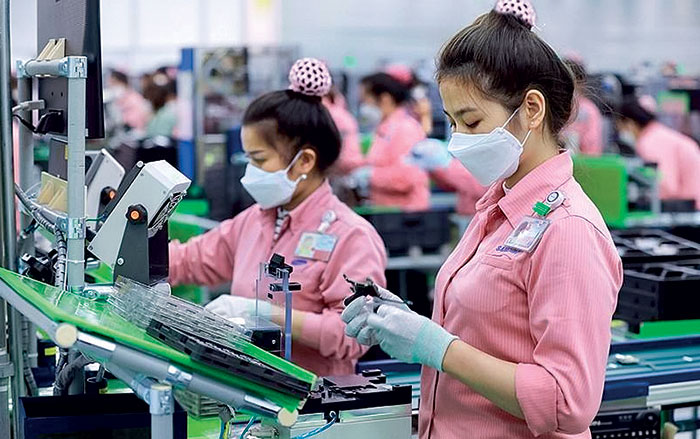
BY S VENKAT NARAYAN
Our Special Correspondent
NEW DELHI, October 15: In 2020, Chinese auto and electronics major BYD, Apple’s largest contract manufacturer of iPads, was looking to shift some of its capacity from China to India. But the move was shelved after geopolitical tensions erupted between the two countries, and India introduced stiff foreign direct investment (FDI) rules for Chinese companies.Now, two years on, BYD has just started rolling out iPads from Vietnam. It has invested $268 million to set up a new factory with a capacity to churn out 4.33 million tablets a year.
Vietnam’s gain is India’s loss. The two Asian countries have been aggressively wooing global companies and their suppliers to shift from China. Growing US-China geopolitical tensions and supply chain disruptions due to sudden closures of factories to combat Covid-19 have impelled many tech players to explore other investment destinations.
India has grabbed one jewel in the crown — Apple Inc. Its vendor Foxconn recently started assembling the latest iPhone 14 within a few days of its global launch. And if everything goes according to script under the production-linked incentive (PLI) scheme, India will account for 12 per cent of the global production value of iPhones, which could go up to 20 per cent by FY26.
The PLI scheme, meant primarily to reduce the cost disadvantage between India and Vietnam for making mobiles, offers an incentive of 4-6 per cent on the production value for five years. But sources in the know clarify that Apple Inc is not shifting manufacture of its AirPods to India.All in all, though, Vietnam is way ahead in the game. Apart from grabbing iPads, The New York Times reported that Google is also shifting the assembly of its latest Pixel 7 mobile phones to Vietnam from China. Reports had said India was also in the reckoning.
Hanoi has also bagged Chinese mobile player Xiaomi, which is contract-manufacturing phones with Chinese DBG in Vietnam for exports to Thailand and Malaysia. Microsoft is manufacturing Xbox consoles there. In the non-electronics space, toy maker Lego, which was scouting for a factory to cater to growing Asian demand (it has a factory in China), opted for Vietnam recently where it has committed an investment of $1 billion.
Vietnam’s crowning glory has been Samsung. Since 2008, the Korean chaebol has invested a staggering $19 billion in the country shifting mobile capacity from China. It recently announced an additional $3.3 billion for semiconductors. As much as 50 per cent of its phones are made in Vietnam and 2021 annual exports were $65.5 billion (three times what Apple promised to manufacture in India in FY26).The new battleground for the two countries is in PCs, laptops and tablets as global brands look to hedge against their over-dependence on China: 75 per cent of all laptops are made in that country.
Vietnam’s share in this space might be just 2 per cent (contract-manufacturing for Dell, Amazon and Google, say reports) but it is furiously licensing contract manufacturers to create capacity and become a hub for the world here, too.To this end, Hanoi has signed an agreement with Foxconn recently to invest $300 million to assemble laptops and tablets, and has given permission to Wistron last year to make computers and peripherals. Nikkei reports that Microsoft might start producing its Surface line, including notebooks and desktops computers.
India’s answer to woo laptop (the bulk of which are imported from China), PC and tablet makers has been through a Production-Linked Incentive (PLI) scheme for IT products, which has failed to take off. Only around four of the 14 eligible players, domestic and global, have succeeded in meeting their production targets, and they say incentives (an average of 2 per cent) are too low and only for four years.
The electronics ministry is now reworking the plan to cater better to the requirements of global players, who have shown interest in shifting capacity from China if the incentives are attractive enough.Yet the big challenge that India faces — which Vietnam does not — is in setting up a supply chain, which both in mobile and IT products is dominated by Chinese manufacturers. But India’s Foreign Direct Investment (FDI) policy has effectively barred them through the automatic approval route, meaning Chinese investment proposals require government scrutiny. Even then, few have been granted permission over the past two years.
For instance, 10 per cent of Apple’s top 200 vendors are based in Vietnam but the bulk of them are from China. In India, Apple has around 12 global suppliers but only three of them are Chinese firms who entered before the FDI restrictions were imposed. As companies like Apple take a big jump in production from this year, higher value addition is possible only if their Chinese vendors are allowed in. India wants value addition upped from 15-20 per cent to 35 per cent in the next four years. Hanoi imposes no such restrictions; locational proximity enhances its attractiveness.
Vietnam has two other key advantages — far lower input tariffs than India, and the ability to leverage its plethora of free trade agreements (FTAs) that allow zero duty entry for exports.A preliminary study being undertaken by global companies points out that average most favoured nation tariffs for mobile phones and its supply chain and selected electronics products for 122 products is at around 9.9 per cent in India compared to 5.7 per cent in Vietnam.
The other problem, say companies, is that unlike Vietnam there is constant fear of differing interpretations and wrong classifications, with the revenue department suddenly raising demands or even accusing global players of round tripping. “There is no pre-consultation and advance authorisation like in Vietnam. Once demands have been made, the only way out is litigation,” said a senior executive of a global electronics company.
Critically, Vietnam has also leveraged its FTAs with over 56 economies that have helped suppress tariff barriers and make it a potential supply chain strategic hub. For instance, its recent FTA with the European Union has lifted tariffs on 85 per cent of Vietnamese goods. India, meanwhile, has abstained from the most consequential of FTAs — the Regional Comprehensive Economic Partnership (RCEP).
Of course, India has the advantage of an abundance of skilled labour available at still lower wages. Vietnam’s wage for workers is half of that of China, where rising wages have become a barrier to investment. But India’s worker wages are still a third of that of China, says an executive of a contract manufacturing company. That apart, Vietnam’s much smaller population has a limited number of skilled workers.But most global players say that this one advantage is not enough. Vietnam has much more flexible labour laws that partly neutralise the advantage. Clearly, India will need much more than cheap labour to leverage global corporations’ China Plus-One strategy.
Business
Lord Swire, Deputy Chairman, CWEIC, points to ‘diverse opportunities’ at Port City Colombo

Port City Colombo, Sri Lanka’s first multi-service Special Economic Zone, recently hosted Lord Swire, Deputy Chairman of the Commonwealth Enterprise and Investment Council (CWEIC) to an exclusive session on the project’s attractive investment opportunities and economic potential within the South Asian regional sphere. He was accompanied by CWEIC officials including Niro Cooke, Country Chair – Sri Lanka and Group Director, The Capital Maharaja Organisation, Pamela O’Leary, Board Member, and Deshan Gonawela, Country Director. The delegation was welcomed by Revan Wickramasuriya, Director General, the Colombo Port City Economic Commission, and Thulci Aluwihare, Deputy Managing Director, CHEC Port City Colombo (Pvt) Ltd.
A Port City Colombo press release said: ‘The visit encompassed a detailed presentation at the Port City Colombo Sales Gallery, where the delegation was briefed on the project progress and future projections as a competitive investment hotspot in the South Asia region. Port City Colombo’s key appeal to top investor markets including the Middle East and the Asia-Pacific, progressive regulatory environment that promotes the ease of doing business, and diverse options for investors, were the focal point of the presentation. The CWEIC delegation was also provided an experiential tour of the Mall at Port City Colombo, South Asia’s pioneering downtown duty-free retail offering, which is already contributing towards Colombo’s evolution as a hub for tourism and business.
‘Sri Lanka needs to show that it is open for Foreign Direct Investment,’ said Lord Swire, Deputy Chairman, CWEIC. ‘There are diverse opportunities, not just in the tea and tourism industry, but also within the scope of Port City Colombo’s Special Economic Zone, which is a truly exciting and ambitious initiative. The Commonwealth showcases some of the most diverse and fastest growing economies in the world, with prospective investors who will be interested in exploring the intriguing opportunities that Port City Colombo and Sri Lanka as a whole are bound to offer.’
‘Niro Cooke, Country Chair – Sri Lanka, CWEIC, and Group Director, The Capital Maharaja Organisation, further elaborated: ‘Sri Lanka has long been a sought-after tourism destination. However, we believe that Sri Lanka has the opportunity to evolve into a competitive diversified service-based economy, which could reinvent our nation into a truly formidable regional business hub. With FDI contributors such as Port City Colombo, a strengthened economic outlook, and strategic locality, Sri Lanka now has the right ingredients to become a progressive investment destination.’
‘As a CWEIC Strategic Partner, Port City Colombo has been actively involved in fostering investor relations across the Commonwealth. Port City Colombo recently participated in the Commonwealth Business Forum 2024 held in Apia, Samoa, where the project’s contribution towards sustainable economic growth and regional skilled mobility within South Asia was accentuated.
‘To learn more about the attractive investment opportunities at Port City Colombo, please visit www.portcitycolombo.lk. For information on Single Window Investment Facilitation and regulatory matters, please visit www.portcitycolombo.gov.lk.’
Business
CBSL clarifies correct use of the word ‘Finance’

The public is hereby informed that, as per Section 10(2) of the Finance Business Act, No. 42 of 2011 (the Act), no person, other than a finance company and an institution specified in Section 10(6) of the Act, shall use the terms ‘finance’, ‘financing’, or ‘financial’ alone or in combination with another word or any of its derivatives or its transliterations or their equivalents in any language, as part of the name or the description or the business name of such person without prior written approval of the Central Bank of Sri Lanka.
In terms of Section 56(4) of the Act, any person who contravenes or fails to comply with the said provision is guilty of an offence under the Act.
The public is strongly advised to adhere to the aforesaid legal requirement.
For further inquiries:
Department of Supervision on Non-Bank Financial Institutions
Telephone number: 0112 477 504
Email address: snbfi_query@cbsl.lk
Business
Classic Car Rally participants take a nostalgic Pit Stop at Heritance Tea Factory
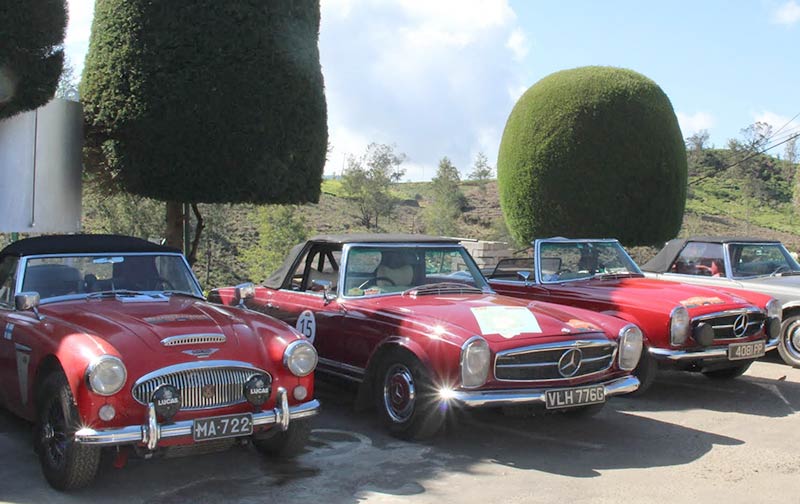
As the much-anticipated 2025 Classic Car Rally made its way through Sri Lanka’s scenic highlands, participants from across the globe found themselves in the heart of tea country at Heritance Tea Factory. A former 19th-century tea factory turned exclusive hotel, this iconic property served as a memorable stop for the rally’s distinguished guests, offering a perfect blend of history, elegance and immersive experiences.
The rally, featuring an impressive lineup of vintage automobiles, included rare and classic models from the 1930s to the 1960s, with iconic names such as Bentley, Jaguar, Mercedes, Porsche, MG, Austin Healey, Delahaye, BMW and Volvo gracing the winding roads of Sri Lanka. These meticulously preserved automobiles, shipped from across the world, added a touch of nostalgia to the misty hills of Kandapola, perfectly complementing the colonial charm and heritage of Heritance Tea Factory.
During their stay, the 24 vintage car owners and enthusiasts, representing countries such as Australia, the United States, Belgium, Switzerland, Italy, Brazil, Germany, and the United Kingdom, experienced the hotel’s colonial charm and the breathtaking views of rolling tea fields. Many took the opportunity to partake in the estate’s signature tea plucking experience, donning traditional attire to hand-pick fresh Ceylon tea leaves, a unique and fitting tribute to Sri Lanka’s rich tea heritage.
Dining at Heritance Tea Factory proved to be another highlight, with the rally participants indulging in delicious menus featuring the finest local and international cuisine, all in all an extraordinary gastronomic experience in the misty mountain ambiance.
Beyond the culinary experiences, the comfort of elegantly restored rooms overlooking the lush tea plantations allowed the travellers to unwind and rejuvenate after a long journey through Sri Lanka’s winding roads. The warmth of the hotel’s hospitality, combined with its eco-conscious approach made a lasting impression on all who stayed.
As the rally continued toward its next destination, Heritance Tea Factory left a special mark on the participants, celebrating a shared love for timeless elegance, heritage, and adventure.
-

 Business4 days ago
Business4 days agoSri Lanka’s 1st Culinary Studio opened by The Hungryislander
-

 Sports5 days ago
Sports5 days agoHow Sri Lanka fumbled their Champions Trophy spot
-

 News6 days ago
News6 days agoSC notices Power Minister and several others over FR petition alleging govt. set to incur loss exceeding Rs 3bn due to irregular tender
-

 Features5 days ago
Features5 days agoThe Murder of a Journalist
-
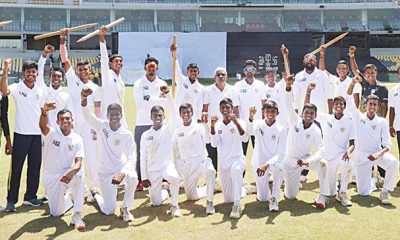
 Sports5 days ago
Sports5 days agoMahinda earn long awaited Tier ‘A’ promotion
-
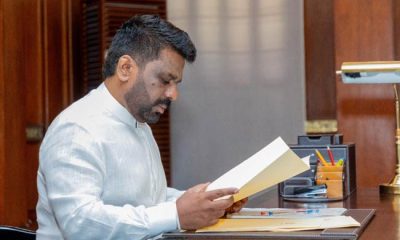
 Features5 days ago
Features5 days agoExcellent Budget by AKD, NPP Inexperience is the Government’s Enemy
-

 News6 days ago
News6 days agoMobile number portability to be introduced in June
-
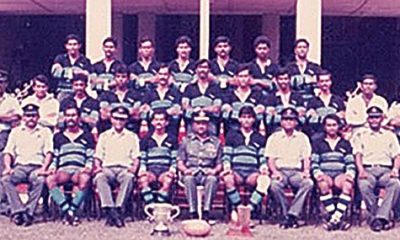
 Sports4 days ago
Sports4 days agoAir Force Rugby on the path to its glorious past











